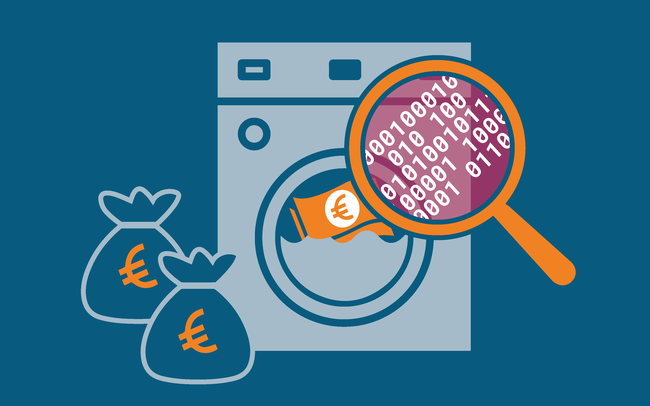MaLeFiz
Machine learning for efficient identification of conspicuous financial transactions

With the help of artificial intelligence, computers can recognize patterns in data in a very short time, which humans can only find after months or not at all. The MaLeFiz project wants to use these new technical possibilities to support financial supervisory authorities and investigators in the fight against money laundering and terrorist financing.
To this end, the project team is developing a solution that can identify indications of money laundering in large volumes of financial data - faster and better than established transaction monitoring procedures. The particular challenge here is that users and investigating authorities must be able to trace the decision-making process at all times.
In order to take all relevant stakeholders into account in the development, financial institutions, law enforcement agencies and legal experts will be involved in the project. Furthermore, the project will define a robust control infrastructure for AI applications and formulate practical recommendations for both developers and end users.
Konsortium
- Deloitte GmbH WPG
Dr. Andreas Burger - The auditing firm Deloitte has extensive project experience in the area of anti-financial crime, especially in the prevention of money laundering. Deloitte Germany's expertise extends to almost every major European bank. Project content typically includes setting up new or updating existing transaction monitoring systems (TMS) and providing expert advice on regulatory issues. Deloitte has a proven track record of extensive as well as in-depth practical experience in the implementation and use of technical tools for money laundering prevention. - Martin-Luther-Universität Halle-Wittenberg
Jun-Prof. Dr. Lucia Sommerer conducts research from a theoretical perspective on the legal and criminological characteristics of computer-mediated crime control. Currently, for example, on the role of offshore financial centers for white-collar crime in Germany. In her doctoral thesis, she already dealt with the necessary transparency requirements of algorithms from a legal-critical perspective and was awarded 1st place of the German Study Prize of the Körber Foundation and the Science Prize of the German Society for Law and Computer Science. - Universität Leipzig
Prof. Dr. Katrin Höffler conducts research on the forecasting of risks in the context of crime prevention, particularly with regard to digitization. A particular focus of her research is her interdisciplinary approach to changing crime in the globally networked society. She investigates the influence of the increasingly (economically) networked world on various areas of crime, especially in connection with the shadow economy, organized crime, and terrorism, at the interface of criminology and criminal law. - Zentrum Technik und Gesellschaft, TU Berlin
Dr. Robert Pelzer - The research area Security - Risk - Criminology of the ZTG has applied methods of integrated technology development and evaluation of societal dimensions of security solutions including the investigation of questions of acceptance as well as risk communication in numerous research and development projects of civil security research on national (KISTRA, SIMKAS-3D, AlphaKomm, 4D Security, Stratum, INTEGER) and EU level (FORTRESS, ASSERT, CRISP, PROFILING, SIAM and Responsibility). The societal consequences of the use of machine learning methods were investigated in particular in the BMBF projects INTEGER (2017-2020) and KISTRA (2020-2023). - Fraunhofer SIT
Prof. Dr. Martin Steinebach - Fraunhofer SIT researches the use of machine learning methods for a variety of different problems, e.g., for the detection of disinformation in texts and images, for the detection of organized crime on the Internet, and in the text forensic application field of authorship recognition. Furthermore, Fraunhofer SIT is intensively researching the aspects of robustness as well as privacy and security of machine learning methods. Fraunhofer SIT has also already developed several image, text and financial forensic methods and tools in the field of software-based fraud detection.

